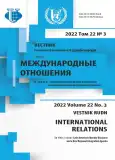Brazil’s New Investment Treaty Model: Why Now?
- Authors: Amorim L.S.1, Menezes H.Z.2
-
Affiliations:
- University of São Paulo
- Federal University of Paraíba
- Issue: Vol 22, No 3 (2022): Latin American Identity Discourse and a New Regional Integration Agenda
- Pages: 600-612
- Section: INTERNATIONAL ECONOMIC RELATIONS
- URL: https://journal-vniispk.ru/2313-0660/article/view/320533
- DOI: https://doi.org/10.22363/2313-0660-2022-22-3-600-612
- ID: 320533
Cite item
Full Text
Abstract
The investment treaty regime, unlike other economic regimes, lacks common substantive multilateral rules and depends on countries signing bilateral or plurilateral investment treaties. As the regime presented a pro-developed country bias, developing countries, especially in Latin America, avoided signing investment treaties up to the 1980s. Brazil followed this trend and did not start an investment treaty program until the late 1990s. However, the treaties never entered into force. The country also avoided acceding to the World Bank agency responsible for investment arbitration proceedings - the International Centre for Settlement of Investment Disputes (ICSID). In 2015, Brazil started a new investment treaty program. However, the timing seems counterintuitive. The investment treaty regime had already been criticized, including inefficiency in attracting foreign investment, the potential to encroach on countries’ regulatory sovereignty and the lack of legitimacy of its investor-state dispute settlement (ISDS) procedure. Furthermore, the favorable foreign economic scenario did not force the country to seek an inflow of foreign capital at that time. The new Cooperation and Facilitation Investment Agreement (CFIA) is presented as an investment treaty model for developing countries, since it responds to major criticisms to the investment treaty regime, and at the same time meets the demands of an important domestic interest group, the Brazilian industrial sector, for a legal framework that mitigates the political risk of its increasingly internationalized operations. Brazil’s CFIA may be viewed as a model that other developing countries could emulate in the face of the failure of the traditional paradigm of investment dispute settlement.
About the authors
Lucas S. Amorim
University of São Paulo
Author for correspondence.
Email: amorimlucas@usp.br
ORCID iD: 0000-0002-8993-9967
PhD Student, Institute of International Relations
São Paulo, BrazilHenrique Z. Menezes
Federal University of Paraíba
Email: hzmenezes@ccsa.ufpb.br
ORCID iD: 0000-0002-1385-7957
PhD (Political Science), Professor, Department of International Relations
João Pessoa, BrazilReferences
- Ahmad, F., Draz, M. U., & Yang, S. C. (2018). Causality nexus of exports, FDI and economic growth of the ASEAN5 economies: Evidence from panel data analysis. The Journal of International Trade & Economic Development, 27(6), 685-700. https://doi.org/10.1080/09638199.2018.1426035
- Amorim, L. S., Baccarini, M. P. O., & Menezes, H. Z. (2021). Missing Calvo? Latin America’s love-hate relationship with the Investment Treaty Regime. Conjuntura Austral, 12(60), 53-65. https://doi.org/10.22456/2178-8839.113289
- Aust, V., Morais, A. I., & Pinto, I. (2020). How does foreign direct investment contribute to Sustainable Development Goals? Evidence from African countries. Journal of Cleaner Production, 245, 1-10. https://doi.org/10.1016/j.jclepro.2019.118823
- Badin, M. R. S., & Morosini, F. (2017). Navigating between resistance and conformity with the international investment regime: The Brazilian agreements on cooperation and facilitation of investments (ACFIs). In F. Morosini & M. R. S. Badin (Eds.), Reconceptualizing international investment law from the Global South (pp. 188-217). Cambridge: Cambridge University Press. https://doi.org/10.1017/9781316996812.007
- Baer, W. (1972). Import substitution and industrialization in Latin America: Experiences and interpretations. Latin American Research Review, 7(1), 95-122.
- Baumann, R. (2020). O debate sobre a facilitação de investimentos. Brasília: IPEA. https://doi.org/10.38116/td2591
- Bonnitcha, J., Poulsen, L., & Waibel, M. (2017). The political economy of the investment treaty regime. Oxford: Oxford University Press. https://doi.org/10.1093/law/9780198719540.001.0001
- Calvo, C. (1896). Le droit international théorique et pratique. Paris: Arthur Rousseau Éditeur.
- Campello, D., & Lemos, L. (2015). The non-ratification of bilateral investment treaties in Brazil: A story of conflict in a land of cooperation. Review of International Political Economy, 22(5), 1055-1086. https://doi.org/10.1080/09692290.2014.987154
- Carvalho, L. (2018). Valsa brasileira: Do boom ao caos econômico. São Paulo: Todavia.
- Choi, W. (2007). The present and future of the investor-State dispute settlement paradigm. Journal of International Economic Law, 10(3), 725-747. https://doi.org/10.1093/jiel/jgm024
- Elkins, Z., Guzman, A., & Simmons, B. (2008). Competing for capital: The diffusion of bilateral investment treaties, 1960-2000. International Organization, 60(4), 811-846. https://doi.org/10.1017/s0020818306060279
- Garcia-Mora, M. R. (1950). The Calvo clause in Latin American constitutions and international law. Marquette Law Review, 33(4), 205-219.
- Hira, A. (2007). Did ISI fail and is neoliberalism the answer for Latin America? Re-assessing common wisdom regarding economic policies in the region. Brazilian Journal of Political Economy, 27(3), 345-356. https://doi.org/10.1590/S0101-31572007000300002
- Hirsch, J. (2010). Teoria materialista do estado. Rio de Janeiro: Editora Revan.
- Lazo, R. (2014). The no of Tokyo revisited: Or how developed countries learned to start worrying and love the Calvo doctrine. ICSID Review - Foreign Investment Law Journal, 30(1), 172-193. https://doi.org/10.1093/icsidreview/siu028
- Lowenfeld, A. (2009). The ICSID convention: Origins and transformation. Georgia Journal of International and Comparative Law, 38(1), 47-61. Retrieved from https://digitalcommons.law.uga.edu/gjicl/vol38/iss1/5
- Morosini, F., & Xavier Jr., E. (2015). Foreign direct investment regulation in Brazil: From resistance to investment bilateral treaties to the emergence of a new regulatory model. Brazilian Journal of International Law, 12(2), 421-447. https://doi.org/10.5102/rdi.v12i2.3586
- Poulsen, L. (2011). Sacrificing sovereignty by chance: Investment treaties, developing countries, and bounded rationality [thesis]. London: London School of Economics and Political Science.
- Tavares, M. (1992). Ajustes e reestruturação nos países centrais: A modernização conservadora. Economia e Sociedade, 1(1), 21-57. Retrieved from https://periodicos.sbu.unicamp.br/ojs/index.php/ecos/article/view/8643308
- White, L. (2013). Emerging powers in Africa: Is Brazil any different? South African Journal of International Affairs, 20(1), 117-136. https://doi.org/10.1080/10220461.2013.781257
- Zeng, H. (2014). Balance, sustainable development, and integration: Innovative path for BIT practice. Journal of International Economic Law, 17(2), 299-332. https://doi.org/10.1093/jiel/jgu019
Supplementary files









